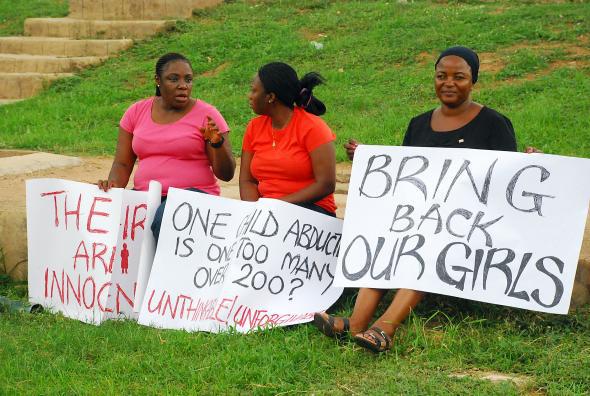More than 200 girls are still being held in captivity by the Nigerian terrorist group Boko Haram, a case that has drawn international attention to the region’s years old insurgency.
Also this week, a group of militants, likely members of Boko Haram, killed hundreds of people in the town of Gamboru Ngala in northern Nigeria, firing into the town with AK-47s and rocket-propelled grenades and lighting houses on fire.
As Adam Nossiter of the New York Times notes, “The missing schoolgirls have grabbed the world’s attention, and more offers of help poured in to the Nigerian government on Wednesday from Britain, China and France. But Boko Haram’s deadly attack on Gamboru Ngala was similar to many others in the past several years that drew little or no notice beyond Nigeria.”
The abduction of the girls is a uniquely hideous crime—one that apparently makes even al-Qaida uncomfortable—but it didn’t exactly happen in a vacuum, and it’s not unreasonable to ask whether the sudden interest from traditional and social media is actually useful.
Zeynep Tufekci articulates much of what has made many uncomfortable with the rapid spread of the #BringBackOurGirls social media campaign beyond Nigeria’s borders. The larger question she asks is whether “attention” and “awareness” are in and of themselves desirable factors in a humanitarian crisis. She writes:
I am wary because attention, as the Turkish saying goes about alcohol, does not sit still once outside the bottle the way it looks while still in the bottle, so quiet, so serene. Once unleashed, attention has its own destructive, powerful wings and breath of fire over which those who unleash it often have little control. Because attention scares me, especially when wielded by the powerless, who need attention more than anyone else, because it escapes their hands so quickly. Because attention, like every other thing in the world, does not live in a context outside of power.
Attention can bring the wrong person to be identified as the bomber in Boston—putting his life in danger; attention thankfully did not lead to a massive external intervention in Uganda (but I wonder how much harder it made it for the country to repair its wounds as only it could?) but it could have; attention even brought on one of the worst mass killings in Iraq—the outrage over the brutal murder of a Yazidi girl was turned by militants into a killing campaign. It’s increasingly clear that (posthumous) attention is what, at least partially, motivates the troubled young men who rampage and kill students in the United States.
It’s good that the Nigerian government is feeling the pressure here, more than three weeks after the girls were taken, but the risks involved in rash or hasty action here shouldn’t be ignored either. As the Financial Times points out today, “Past efforts to free smaller numbers of hostages from Boko Haram militants have led to their murder.” (Keep this in mind when you read someone like Piers Morgan suggesting that if the U.S. would just send in Delta Force, this would all be wrapped up.) And in its efforts to combat the group in the past, the Nigerian military has itself been implicated in its own serious rights abuses.
The comparisons between #BringBackOurGirls, the social media campaign that has taken off in recent days with boosts from everyone from John Kerry to Chelsea Clinton to Chris Brown, and #Kony2012, the phenomenally successful but dangerously simplistic and misleading campaign centered around the Lord’s Resistance Army that took off two years ago, are obvious. Though as Adam Taylor points out, there are some key differences.
For one thing, #BringBackOurGirls originated in Nigeria, as opposed to being created by an American NGO selling bracelets. Specifically, it seems to have been created by Obiageli Ezekwesili, a former Nigerian minister of education.
Moreover, it has a specific goal—the return of the girls—rather than the vague premise of simply getting governments to do something about a group that had been active for years before American Twitter users decided to take notice.
On the other hand, as Nigerian novelist Teju Cole notes, the adoption of the hashtag by everyone from Piers Morgan giving dubious military advice to the Nigerian police themselves somewhat dilutes the message.
The return of the girls will likely require either a risky military operation or controversial negotiations, neither of which international attention seems likely to hasten. But it’s clear that the Nigerian government, which also happens to be hosting a meeting of the World Economic Forum and is clearly looking to present itself as an emerging economic powerhouse, is already feeling the pressure to prevent this from happening again. An international plan backed by Nigerian business leaders to secure the country’s schools was unveiled at this week’s conference, for instance.
#BringBackOurGirls—either the hashtag itself or the larger campaign behind it—may not end this particular crisis, but if it puts some pressure on the government to address the root causes of the country’s violence and make it safer for girls to attend school, it may yet do some good.
Ultimately, however, experience tells us that international attention will fade quickly. The question is whether this crisis will be a turning point within Nigeria, and whether the country’s outraged citizens can keep the pressure on.
